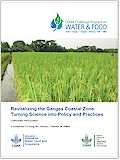| Paper |
 |
|
| Title | Multiple actors, conflicting roles and perverse incentives: The case of poor operation and maintenance of coastal polders in Bangladesh | | Author | Farhat Naz and M-C Buisson | | Editor | E. Humphreys, T.P. Tuong, M.C. Buisson, I. Pukinskis and M. Phillips | | Year | 2015 | | Parent Title | Revitalizing the Ganges Coastal Zone: Turning Science into Policy and Practices. Conference Proceedings. | | Publisher | CGIAR Challenge Program on Water and Food (CPWF) | | City of Publication | Colombo, Sri Lanka | | Pages | 147-161 | | Call Number | PP0361-15 | | Keywords | water management, community-based natural resources management, decentralization, actors, power |
|
| Abstract: |
The government of Bangladesh invested in large scale coastal embankment projects in the 1960s and 1970s. The polders that were developed played an important role in protecting coastal communities from water-related disasters and in increasing agricultural productivity. However, over time maintenance of these infrastructures became a major concern leading to the creation of a national policy that requires local communities to participate in their operation and maintenance.
In this paper we are interested in understanding what determines the poor state of affairs of the polders. One way to examine this will be through the lens of operation and maintenance (O&M) and the practical strategies adopted by different actors for O&M. This paper consequently discusses the roles and responsibilities of these multiples actors in operation and maintenance of water infrastructure in the coastal zone of Bangladesh. The analysis is based on primary data collected in 2012 and 2013 in nine study sites from the coastal zone. Qualitative data was collected in these nine sites through focus group discussions and key information interviews.
An in-depth analysis of how operation and maintenance activities actually take place reveals that the multiplicity of actors involved in operation creates overlaps and conflicts, resulting in the strategic deferral of
maintenance by different actors and eventual disrepair and degradation of the infrastructures. Ultimately, the
unclear demarcation of roles and responsibilities for these actors curtails the short and long term
sustainability of water management in the polder area. The paper recommends revising the legal water
management framework, improving coordination and giving a formal role to local government institutions. |
|
|
Download file(s): Click icon to download/open file.
|
| |
File Size |
Description |

|
1,339 KB |
Softcopy |
|
|
|
| Viewed in 487 times. Downloaded in 385 times. |